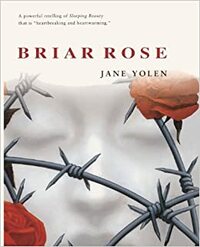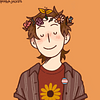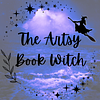Take a photo of a barcode or cover
I loved this book. It was a very interesting take of the Holocaust and Sleeping Beauty. It captures you in and you feel like you're in it watching everything happen. I will read this again for sure!
While the idea behind the story was really clever, it was hard to connect to the characters and it was too depressing to enjoy.
I picked this as a read aloud for my daughter. We had read another book by Yolen, and we happy to start another one. But this one was not the best for read aloud. And I found that this was a bit harder to get into. The search drug out far too long. In fact, i pretty much skimmed the last few chapters just to finish it.
"Gemma" has told the tale of Briar Rose to her three granddaughters for as long as they can remember, but on her death bed, in a moment of lucidity, Gemma emphatically informs Becca that she actually is Briar Rose. A box full of Gemma's secret possessions leads Becca to unravel the mystery of her grandmother's past in a harrowing holocaust story.
Imaginative re-tellings of fairy tales can be hit or miss for me, but this book really caught my attention with the way it took the story of Sleeping Beauty well beyond its darker roots. Becca's actual journey, which takes her all the way to Poland, has many interesting and endearing moments, but the magic of this book is how Yolen weaves Gemma’s apparent fairy tale into the reality, teasing out the story of Briar Rose bit by bit, until it reaches its bittersweet conclusion.
Imaginative re-tellings of fairy tales can be hit or miss for me, but this book really caught my attention with the way it took the story of Sleeping Beauty well beyond its darker roots. Becca's actual journey, which takes her all the way to Poland, has many interesting and endearing moments, but the magic of this book is how Yolen weaves Gemma’s apparent fairy tale into the reality, teasing out the story of Briar Rose bit by bit, until it reaches its bittersweet conclusion.
A woman tells her grandchildren a story. It is the same story over and over again, and neither the woman nor the grandchildren ever seem to tire of it, though over the years their responses to the story become more fractious. On her deathbed, she repeats the story again and again, the story of Briar Rose who sleeps for a hundred years in a castle surrounded by thorns until she is awakened with a kiss. Her last dying wish to her youngest granddaughter, Becca, now a journalist, is to find this fairy-tale castle. An impossible task. After all, it's just a story. But amongst her belongings is a box, and in that box are clues, and those clues will lead Becca to another story hidden behind the fairy tale.
This short, lovely book packs an enormous emotional wallop. It's easy to get a little impatient with the opening chapters of family life and the early stages of the investigation. After all, the canny reader will be well aware of where this is all going. But the domestic scenes, the painstaking search and the long journeys lay the groundwork for the final story, teasing, laying careful threads about family and the job of searching for the truth before finally plunging us into the past, so that the full and devastating power of a lovely, haunting tale pulled from the wreckage of unimaginable horror can only be properly understood in the context of survival and remembrance.
There are those who question whether Art can truly exist in a world where the Holocaust occurred, and in truth this book is a flimsy little thing to set against those years when God, whether real and outside of us or imagined and within us, turned away. But so too are fairy stories, flimsy, ragged things out of the darkest, deepest shadows of history. If works like this add to the remembrance, then perhaps they are justified, but that's not for me to say.
This short, lovely book packs an enormous emotional wallop. It's easy to get a little impatient with the opening chapters of family life and the early stages of the investigation. After all, the canny reader will be well aware of where this is all going. But the domestic scenes, the painstaking search and the long journeys lay the groundwork for the final story, teasing, laying careful threads about family and the job of searching for the truth before finally plunging us into the past, so that the full and devastating power of a lovely, haunting tale pulled from the wreckage of unimaginable horror can only be properly understood in the context of survival and remembrance.
There are those who question whether Art can truly exist in a world where the Holocaust occurred, and in truth this book is a flimsy little thing to set against those years when God, whether real and outside of us or imagined and within us, turned away. But so too are fairy stories, flimsy, ragged things out of the darkest, deepest shadows of history. If works like this add to the remembrance, then perhaps they are justified, but that's not for me to say.
3.5
Gemma, tell your story again.
I told myself I'd stop reading Holocaust books but this one tricked me into reading it by saying it was a Sleeping Beauty retelling
I mean technically it was but a very brutal one
the good: I liked the way the puzzle/mystery was set up, and gradually finding out what happened, and how it was all related to Sleeping Beauty. (the people who keep sleeping and the kiss that wakes her up? like wow). I also liked the way the Gemma flashbacks were alternating with the present.
the bad: I didn't care about the present-time characters or the romance at all, but then again that wasn't the focus.
TWs: uh, everything? Holocaust, genocide, extermination camps, suicide, homophobia, anti-semitism. you name it.
Gemma, tell your story again.
I told myself I'd stop reading Holocaust books but this one tricked me into reading it by saying it was a Sleeping Beauty retelling
I mean technically it was but a very brutal one
the good: I liked the way the puzzle/mystery was set up, and gradually finding out what happened, and how it was all related to Sleeping Beauty. (the people who keep sleeping and the kiss that wakes her up? like wow). I also liked the way the Gemma flashbacks were alternating with the present.
the bad: I didn't care about the present-time characters or the romance at all, but then again that wasn't the focus.
TWs: uh, everything? Holocaust, genocide, extermination camps, suicide, homophobia, anti-semitism. you name it.
This was an interesting read. I didn't realize until about a third of the way through that this book was written in the 90s. It didn't change anything but the writing and the world felt better once I knew when I was.
That said, this book does some neat things intertwining a fairy tale with a real life event like the Holocaust. I saw the parallels early on but I liked seeing the stories mesh. I didn't like the sudden wall you hit partway through the story. You have Becca and her family/story but then you get another character telling the story of Gemma in a completely different way before you're pulled back to a rushed up ending to Becca's story. Rushed isn't exactly the right word but I didn't like that I had so much time getting to know Becca with little to no ending other than "she got the obvious prince".
That said, this book does some neat things intertwining a fairy tale with a real life event like the Holocaust. I saw the parallels early on but I liked seeing the stories mesh. I didn't like the sudden wall you hit partway through the story. You have Becca and her family/story but then you get another character telling the story of Gemma in a completely different way before you're pulled back to a rushed up ending to Becca's story. Rushed isn't exactly the right word but I didn't like that I had so much time getting to know Becca with little to no ending other than "she got the obvious prince".
Before I truly looked at the plot, I thought that this would be about Sleeping Beauty and have it be a fairy tale. Now don't get me wrong, I LOVE Sleeping Beauty but this just didn't hit the mark for me. I didn't like Yolen's style of writing and never got into the Holocaust part of the novel.





